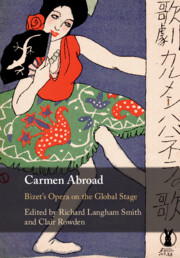Book contents
- Carmen Abroad
- Carmen Abroad
- Copyright page
- Contents
- Figures
- Tables
- Preface
- Acknowledgements
- Notes on Contributors
- Part I Establishment in Paris and the Repertoire
- Part II Across Frontiers
- 7 A New Performance for the New World: Carmen in America
- 8 The Unstoppable March of Time: Carmen, and New Orleans in Transition
- 9 The Return of the Habanera: Carmen’s Early Reception in Latin America
- 10 From Spain to Lusophone Lands: Carmen in Portugal and Brazil
- 11 Carmen in the Antipodes
- 12 Carmen, as Seen and Heard in Victorian Britain
- 13 Celtic Carmens: Rebellion and Redemption
- 14 Carmen for the Czechs and Germans, 1880 to 1945
- 15 Carmen in Poland prior to 1918
- 16 A Woman or a Demon: Carmen in the Late Nineteenth-Century Nordic Countries
- Part III Localising Carmen
- Selected Bibliography
- Index
- References
11 - Carmen in the Antipodes
from Part II - Across Frontiers
Published online by Cambridge University Press: 18 September 2020
- Carmen Abroad
- Carmen Abroad
- Copyright page
- Contents
- Figures
- Tables
- Preface
- Acknowledgements
- Notes on Contributors
- Part I Establishment in Paris and the Repertoire
- Part II Across Frontiers
- 7 A New Performance for the New World: Carmen in America
- 8 The Unstoppable March of Time: Carmen, and New Orleans in Transition
- 9 The Return of the Habanera: Carmen’s Early Reception in Latin America
- 10 From Spain to Lusophone Lands: Carmen in Portugal and Brazil
- 11 Carmen in the Antipodes
- 12 Carmen, as Seen and Heard in Victorian Britain
- 13 Celtic Carmens: Rebellion and Redemption
- 14 Carmen for the Czechs and Germans, 1880 to 1945
- 15 Carmen in Poland prior to 1918
- 16 A Woman or a Demon: Carmen in the Late Nineteenth-Century Nordic Countries
- Part III Localising Carmen
- Selected Bibliography
- Index
- References
Summary
There were no permanent professional opera companies in Australia in the nineteenth century. However, visits from touring companies were frequent, especially after the Gold Rush, when, as one critic put it, ‘all the glittering operatic repertoire of mid-nineteenth century Europe filled the antipodean air.’ In the period under consideration, there were many productions of Carmen by major touring companies and also by more ad hoc touring artists who joined up with local groups. I have chosen to focus on the four most significant productions of the period.
The first production of Carmen was in 1879 by William Saurin Lyster’s opera company. This production established the opera’s popularity in Australia and was followed by a number of less satisfactory productions in the final decades of the century. In 1907, Lyster’s nephew, George Musgrove brought a German opera company to Australia who performed Carmen in German. This was followed by a spectacular performance by the Melba-Williamson company of 1911 and then perhaps the most professional productions to date, by English entrepreneur Thomas Quinlan’s touring companies (1912, 1913).
This chapter examines the controversy surrounding the opera and the critical response to the character of Carmen in light of the colonial desire for respectability.
Keywords
- Type
- Chapter
- Information
- Carmen AbroadBizet's Opera on the Global Stage, pp. 171 - 185Publisher: Cambridge University PressPrint publication year: 2020
References
Archives
J. C. Williamson Collection, National Library of Australia, Canberra.
J. C. Williamson Theatres Ltd collections, Australian Performing Arts Collection, Arts Centre Melbourne.
Newspapers and Periodical literature
The Advertiser (Adelaide)
The Age (Melbourne)
The Argus (Melbourne)
Australian Star (Sydney)
Australian Town and Country Journal (Sydney)
Ballarat Star (Victoria)
The Evening Journal (Adelaide)
The Evening News (Sydney)
The Examiner (Launceston)
Geelong Advertiser
The Herald (Melbourne)
The Leader (Melbourne)
New York World
Punch (Melbourne)
The Quiz and the Lantern (Adelaide)
The Star (Sydney)
Sydney Mail
Sydney Mail and New South Wales Advertiser
Sydney Morning Herald
Table Talk (Melbourne)
The Truth (Sydney)
The Week (Brisbane)
Scores and libretti
Bizet, George. Carmen, trans. Henry Hersee, London, Dickens & Evans [1879].
Carmen. An Opera in Four Acts. Libretto by Henry Meilhac and Ludovic Halévy. Composed by Georges Bizet. English Adaptation by Henry Hersee. Book of Words. Authorized version. London, Metzler, n. d. [1879].
Carmen: a grand opera, music by Georges Bizet; words by H. Meilhac & L. Halévy; translated from the original French by Fred Leyster [sic], Melbourne, Wk. Marshall Printer [Lorgnette Office], 1879.
Carmen up to data. Edited by P. F. Campiglio, libretto Geo. R. Sims & Henry Pettitt; music by Meyer Lutz, London, E. Ascherberg & Co., 1890.
Faust up to date. Libretto Geo. R. Sims & Henry Pettitt; music by Meyer Lutz, London, E. Ascherberg & Co., n. d. [1888?].

